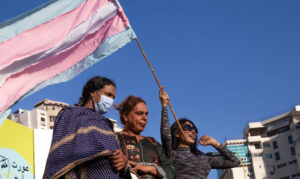Pakistan is in a mess. Controlled by an increasingly unpopular military, the nation is teetering on the brink of default. By July, the country’s foreign exchange reserves are set to fall below $3 billion, barely sufficient to cover a month’s worth of imports. An “Economic Revival Plan” was unveiled last Tuesday, but rather than a genuine attempt at fiscal reform, it appears to be a vehicle for the army to further subsume the civilian government. There was, only a few weeks before, a 16% hike in the defence budget.
Pakistan needs friends, but they are in short supply. Since Partition in August 1947, the Government has fabricated a national identity hinged around despising India. Delusions of grandeur followed — and now they are starting to shatter.
The secession of Pakistan’s eastern wing in 1971 after war with India should have been a rude awakening. It should also have binned the narrative that India is trying to annex its territory, since New Delhi facilitated the transition of East Pakistan to an independent Bangladesh, instead of gulping it down as war spoil. The creation of Bangladesh should also have disabused Pakistan of the farcical notion that adherence to Islam can forge a single national identity — if indeed that weren’t obvious from the presence of two separate Muslim-majority states along Pakistan’s western border.
Instead, under Zulfikar Ali Bhutto, who led the country post-1971, Pakistan Islamised the constitution, propelled jihadist groups towards Afghanistan in search of more geopolitical influence, and invited investment of freshly-minted Arab petrodollars. Since then, Pakistan’s leaders have enabled the establishment of Taliban rule in Afghanistan, the Talibanisation of Pakistan itself, and the radical Islamisation of Kashmir, as well as multiple jihadist attacks on India. Yet even after decades of jihadism backfiring on Pakistan, the country’s leaders still won’t rethink their extreme, religionist narrative on India. Incumbent Foreign Minister Bilawal Bhutto-Zardari doesn’t hesitate to use Islamist rhetoric in discussing Kashmir; Imran Khan confidently urges Indian Muslims to pick up arms against the state.
The trouble is that Islamist policies created Pakistan, rather than the other way around. Hostility towards India, therefore, is not temporary opportunism on the part of Islamists, but the consequence of centuries-old political and theological narratives. Once the British Raj took over, the Muslim elite of India became increasingly apprehensive about the possibility of eventually living in a Hindu majority nation, and struggled for religionist separation. This became the ideological raison d’être of Pakistan, in the form of the Two Nation Theory: “Muslims and Hindus are two separate nations that cannot live together.” For the past 76 years, “Muslim” Pakistan let this narrative direct its relations with “Hindu” India.
Today, the nations’ differences are most obvious in the economic realm: Pakistan and India have foreign reserves of $3 billion and $600 billion respectively. While pointing this out might have been met with accusations of treason in Pakistan until a couple of years ago, recent events have led to the beginning of a massive rethink. After Imran Khan’s government became the latest to be ousted by the military’s machinations last year, anti-army sentiments have been simmering. But even more critically, the extent of Pakistan’s ongoing fiscal crisis has made people question the army’s grandiose rhetoric, including the gross impracticality of any ambitions for Kashmir, given the economic strides India is making. Pakistan is missing out on at least $37 billion worth of potential trade with India annually, owing to its obstinate fixation with self-inflating Islam-centric narratives.
With the already limited trade with India largely frozen since the border skirmishes of 2019, Pakistan has instead looked to China. The $62 billion China Pakistan Economic Corridor (CPEC) is Beijing’s biggest-ever overseas investment. Part of the Belt and Road Initiative, CPEC was supposed to be a fiscal lifeline, but it has instead metamorphosed into a debt trap, owing to skewed agreements predominantly dictated by Beijing. CPEC is starting to seem more like a neocolonial venture, a front for the Chinese takeover of Pakistan, which is leading to human rights abuses and mass appropriation of resources. The Chinese stranglehold has left Islamabad with little choice but to continually express gratitude to Beijing over partial loans to pay import bills issued mostly, of course, by China.
For Pakistan, which has persistently chosen to alienate all its neighbours, the only rational way forward would be to actively work towards regional cooperation — beginning with the subcontinent’s largest country. The longer Pakistan takes to come to this conclusion, the harder it will be. Today, better ties with India aren’t something that Pakistan can simply ask for; Islamabad would need to offer some incentive. It would have to right those wrongs that leaders in Pakistan have openly confessed to: the provocation of wars, the facilitation of India-bound jihadist groups such as the JeM or the Lashkar-e-Taiba, which orchestrated, among others, the 2008 Mumbai attacks. Gaining India’s trust will be very, very difficult.
Moreover, Pakistan will face internal resistance from the jihadist superstructure it has buttressed for years. Every time there are ostensible steps towards initiation of peace with India, that structure responds with a coordinated manoeuvre. After the 2001 Agra Summit, there was an attack on the Indian Parliament; after Narendra Modi’s visit to Pakistan in 2015, there was the Pathankot raid. If Pakistan is to develop strong, productive ties in the region, it must stop supporting jihadist outfits of any variety. Pakistan will also have to start acknowledging the simple reality that the Indian subcontinent has a shared history spanning millennia — and hence overlapping cultures, languages, and customs. Finally, Pakistan’s economy would have to reinvent itself as growth-oriented, rather than heavily militarised and reliant on foreign aid. These steps could usher in a future of better politico-economic collaboration — and put an end to the submissive, extractive alliance with China.
Unfortunately, the supposed peaceniks in Pakistan have instead been fixated on their own anti-India agenda. For them, the recent surge in Hindutva nationalism driven by Delhi, and the targeting of Muslims, vindicates Pakistan’s separation. They tend to gloss over the fact that religious minorities are disproportionately looking to leave Pakistan for India, while Indian Muslims aren’t exactly queueing up to move in the other direction. They ignore, too, the fact that, despite Hindutva ambitions to reconvert disputed mosques into Hindu temples, there are over 300,000 mosques in India, with numerous under construction or renovation. By contrast, not a single Hindu temple has been constructed over the past 76 years in Pakistan.
Even leaving aside the possibility that the increasing marginalisation of Indian Muslims could be a side-effect of Pakistan’s creation, a country founded and sustained on Muslim nationalism has little grounds to criticise Hindu nationalism. And besides, all this bickering over whose nationalism is more toxic, and whose treatment of Kashmir is worse, pales into insignificance when one considers the glaring difference in the two nations’ global standing.
More than anything else, the success of Pakistan’s “bleed India with a thousand cuts” policy can be gauged by the volumes of blood the country has shed of its own people. More than 80,000 Pakistanis are direct victims of jihadist attacks. But where glorification of death in the name of “martyrdom” has belittled the colossal loss of life, Pakistan’s rapidly emptying coffers might leave the nation with no choice but to surrender — especially with Saudi Arabia pulling the plug on jihadi funding. The still-rising defence budget suggests that the Pakistan army is refusing to let go of its delusions of grandeur. It is only a matter of time, though, before it caves. At the end of the day, governments need money to run a country, and for that they need allies. A nation cannot live on stories alone.
Disclaimer
Some of the posts we share are controversial and we do not necessarily agree with them in the whole extend. Sometimes we agree with the content or part of it but we do not agree with the narration or language. Nevertheless we find them somehow interesting, valuable and/or informative or we share them, because we strongly believe in freedom of speech, free press and journalism. We strongly encourage you to have a critical approach to all the content, do your own research and analysis to build your own opinion.
We would be glad to have your feedback.
Source: UnHerd Read the original article here: https://unherd.com/



